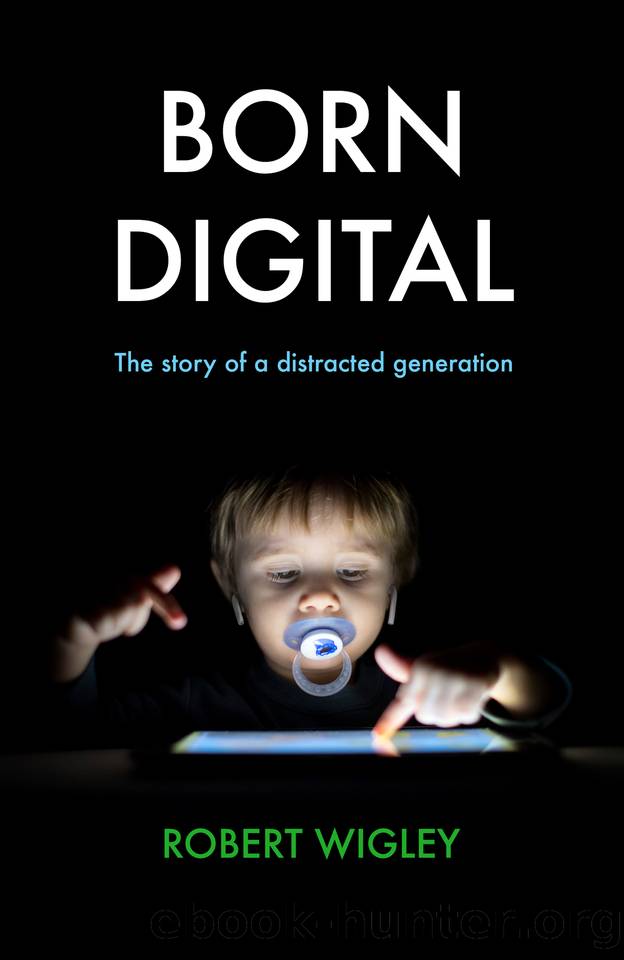Born Digital: The Story of a Distracted Generation by Robert Wigley

Author:Robert Wigley [Wigley, Robert]
Language: eng
Format: epub
Publisher: Whitefox Publishing
Published: 2021-03-11T00:00:00+00:00
10
FORGET RELIGION, MARRIAGE AND TWO OPPOSITE-SEX PARENTS
In a time when people thought the world was flat and science remained a developing field, there was more need for religion. It served a useful purpose. It gave a context for life, it presented hope and comfort and suggested rules that were useful to the orderly running of society. But as someone who has spent most of his early life in and around churches, believing in Christianity at some level, I have always wondered if the Christian story isnât simply a case of brilliant marketing. Religion has long served as a useful way of explaining the unexplainable. Churches were also key institutions of community, including for news dissemination and spreading public information to parishes where literacy was low. The digital revolution has arguably displaced any need for this function. The trend amongst millennials to disengage with church and religion was quite dramatic. And in Generation Z it has accelerated.
The proportion of young US adults who purport not to subscribe to any religion now stands at 23 per cent, according to White. Moreover, âabout 19 per cent of Americans would call themselves âformerâ Christiansâ.1 About one in four adults under the age of thirty are non-religious.2 A Pew Research study suggests that even of those who purport to believe in God, 62 per cent never pray.3 For White, âThe pattern is indisputable. The younger the generation, the more post-Christian it is.â4 The same trend applies in the UK, where 45 per cent of the population, and nearly two-thirds of those under the age of twenty-five, are non-religious.
The 2009 British Social Attitudes Survey indicated that 53 per cent of those surveyed would classify as not religious at all.5 The European Social Survey showed that 53 per cent of those surveyed identified with no religion.6 In 2018, Londonâs St Maryâs University Centre for Religion and Society produced a study suggesting that 70 per cent of the population aged sixteen to twenty-nine identified as not religious.7
The trend towards no religion has become self-reinforcing. Two factors make this so. Since the biggest factor in driving religious affiliation tends to be parental affiliation, as Generation Zâs parents and older siblings have disengaged, so Generation Z has been encouraged to engage less. And as the proportion of non-religious folks has grown, so too has the acceptability of such a position. To the extent that younger generations engage with religion, for many the trend is towards âreligion liteâ â attending services sporadically and during holidays or cultural events: convenient, an experience, but not driven by belief.
Uniform societies tend to drive religious affiliation. Multicultural communities with exposure to diversity do not drive religious affiliation to the same extent. As White notes, Generation Z is âfacing radical changes in technology and understandings of family, sexuality and genderâ. The younger generations occupy multigenerational households, and moreover, âthe fastest growing demographic within their age group is multiracialâ.8 As a result, Generation Z is the most diverse generation to date â in terms of ethnicity, race and religion.
Download
This site does not store any files on its server. We only index and link to content provided by other sites. Please contact the content providers to delete copyright contents if any and email us, we'll remove relevant links or contents immediately.
Cecilia; Or, Memoirs of an Heiress — Volume 1 by Fanny Burney(31443)
Cecilia; Or, Memoirs of an Heiress — Volume 3 by Fanny Burney(31034)
Cecilia; Or, Memoirs of an Heiress — Volume 2 by Fanny Burney(30981)
The Great Music City by Andrea Baker(22890)
We're Going to Need More Wine by Gabrielle Union(18123)
Bombshells: Glamour Girls of a Lifetime by Sullivan Steve(13157)
Pimp by Iceberg Slim(12998)
All the Missing Girls by Megan Miranda(12833)
Fifty Shades Freed by E L James(12490)
Talking to Strangers by Malcolm Gladwell(11983)
Norse Mythology by Gaiman Neil(11958)
Crazy Rich Asians by Kevin Kwan(8409)
Mindhunter: Inside the FBI's Elite Serial Crime Unit by John E. Douglas & Mark Olshaker(7896)
The Lost Art of Listening by Michael P. Nichols(6530)
Enlightenment Now: The Case for Reason, Science, Humanism, and Progress by Steven Pinker(6447)
Bad Blood by John Carreyrou(5816)
The Four Agreements by Don Miguel Ruiz(5577)
Weapons of Math Destruction by Cathy O'Neil(5094)
We Need to Talk by Celeste Headlee(4920)
